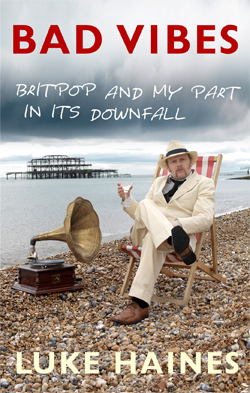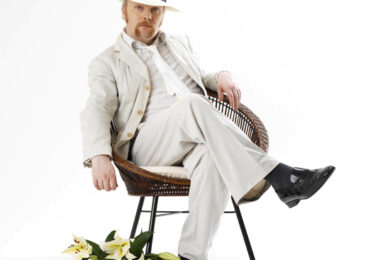"I’m not really the kind of person you’d want on your TV set. Or in the public eye", chuckles Luke Haines down the phone line. "I don’t think that that would benefit anyone, really."
One might be forgiven for being slightly surprised by such a display of humility from a man who subtitled his first record with ‘The songwriting genius of Luke Haines And The Auteurs’ just as he proclaimed it "Best debut album of the 90s, no contest". Given his perceived status as a hideously underrated nearly-man who’s a grouchy malcontent possessed of monumental hubris, you might be surprised to learn that Luke Haines is a perfectly affable conversationalist. Reason for this, one might fancifully suggest, may be the purging release of Bad Vibes, his fresh-on-the-racks book on his dealings with the fickle mistress of fame in the mid-90s.
For all those who’ve thrilled to Luke Haines’ dry musing on the perils of showbusiness and his endearingly misanthropic worldview over the years, this book comes as something of a tonic. Nether a simple memoir, nor an overarching study of the Britpop zeitgeist (like, say, John Harris’ The Last Party) rather it’s an acerbically-rendered portrait of a man who would always be reluctant to join any club that would have him as a member. Bewildered and amused by finding himself and his outfit The Auteurs accidentally feted and fashionable, Haines observes those around him in the giddy indie-pop stratospheres with wry amusement at best, and undisguised contempt at worst, for all the world like Statler and Waldorf by way of Kenneth Tynan. Yet as he saunters through the gaudy 90s netherworld, doing battle with Dani Behr’s Hotel Babylon one minute and welcoming Metallica’s Kirk Hammett as an unexpected house-guest the next, Haines is never short of a dash of joie-de-vivre and an endearing irreverence that always stops his commentary from sounding overly self-satisfied.

In fact, Bad Vibes didn’t even start life as some itch in Haines’ psyche to spin the yarn of his life-story: Rather he arrived at this destination almost by accident. "I wasn’t really trying to write an autobiography or a memoir," he notes, "but ten years ago I started writing a fictional book, which I didn’t get around to finishing, so it was always in my head to write something, and I’d write short stories for my own amusement. I had a big falling out with my record label round about 2006, who ‘forgot’ to pay me the advance for the album, so I didn’t want to do music for a while. At that point, a publisher called up and asked if I would be interested in writing something. I kind of was but I didn’t know what I was gonna write, and it turned out to be Bad Vibes."
Despite the Spike Milligan-referencing Britpop – My Part In Its Downfall subtitle, the general impression that comes across from Bad Vibes is of Haines’ participation in the movement, brazen ambition notwithstanding, being rather unplanned. New Wave, the album that catapulted The Auteurs into the initial early-nineties music press fervour for all things homegrown and anti-grunge, was entirely recorded before the band even had a major deal. What’s more, after this understated and charming effort brought him fame in France and critical acclaim here, it was followed by records which appeared to be less following the career-style trajectories of many of his peers, and more attempting to sabotage whatever chance he had of ever fitting in anywhere in sight. From including the word "Cowboy" in an album title at the height of Britpop, all the way to writing a concept album about German terrorism of the early 70s, Haines’ spanner-in-the-works status is the reason many have such high regard for him in the here and now. [continues below]
The Auteurs – ‘Light Aircraft On Fire’
What’s more, Bad Vibes throws itself into the belly of the beast, so to speak, by being written in the present tense. "I started writing it retrospectively with a bit of hindsight," Haines reveals, "and I didn’t really like what I was writing, It was hard to get any jokes in, so eventually I ended up getting the idea of inhabiting the shoes of the person I was when I was actually experiencing it, as a 26 year old. Even though this might not mean I came across as particularly likeable, I think that was a much more valid way of approaching it."
So what of that notorious period when a nation’s ego swelled to unsightly new proportions? In Bad Vibes, ‘Don’t Look Back In Anger’ is described, pretty accurately, as a "brainless, oafish anthem about nothing at all", and Justine Frischmann as "a drag, an ambitious media arriviste". Yet Haines is also at points to point out that as much as contemporary revisionism might like to paint the period as a Union-Jack-shaded landscape of Adidas tops and red phone boxes, the top spots in the pop chart were still largely occupied by the likes of Mr. Blobby and E-17. "It think it’s true when you look back on any era, I mean from punk or whatever onwards, that it seems the perspectives are warped in retrospect. I mean, even if you look at a band like The Go-Betweens, who every time I see them mentioned now, it’s always with ‘the underrated’ or ‘the great lost band’. And at the time, these people were considered legends, and were selling out what’s now The Forum."
"It was just a kind of national mood thing," he reflects on Britpop. "This kind of self-confidence that gathered momentum as the nineties went on, even besides the music, like Euro ’96, which, from the perspective of someone who wasn’t particularly involved with it, it seemed like everyone suddenly got patriotically obsessed with football, and then of course there was Diana. It ultimately didn’t amount to anything all that interesting."
Does he view the period in retrospect as something of a crisis of creativity in the areas he inhabited? "I think if you look at, I don’t know, even some of the music that was around in the early seventies, like take a figure like Robert Calvert, writing these outlandish concept albums about Martians taking over the planet and what-have-you. I think if you compare the Britpop era to that kind of thing, there obviously was something of a dearth of inspiration there." [continues below]
Black Box Recorder – ‘The Art of Driving’
Indeed, and in some ways understandably, Pulp are pretty much the only contemporaneous band Haines seems to have any respect for, despite them being rivals at the time: "It does seem ridiculous now, that I’d be watching chart positions and saying things like ‘Pulp have blown it now’, because ‘Lipgloss’ had gone into the charts three places lower than ‘Lenny Valentino’. Because ‘Razzmatazz’ for me was the Pulp single, and anything after that was going to be a disappointment. With the mood of the time, it was ‘It’s all over for Pulp!’"
So surely he can’t really look back on an entire decade and find nothing of any consequence besides his own work?
There’s a pause. "I think I can," he intones dryly, before catching himself and laughing. "I mean, back then, the way things were, even if someone had been doing something I’d liked, I’d probably have just viewed them as competition, and ignored it."
Bad Vibes draws to a halt in 1997, leaving a whole range of other chapters in Haines’ chequered and ever-entertaining past unturned, but any hopes for a sequel won’t be fulfilled just yet, as he’s too busy forging the groundwork for new ones. Haines freely admits that he’s a man out of touch with the contemporary music scene, but more often than not this would seem to be working to his advantage, especially in the case of a certain band who actually irked him so much in Bad Vibes he was actually moved to shoot a flare gun at them from a hotel window. "Someone asked me the other day how I feel about The Verve coming back on the scene, because they were my label mates and contemporaries at the time, and I didn’t even fucking know anything about it. I had no idea."
Thus, in splendid isolation, a second solo album currently being mixed, which according to him is "not as glammy" as his first Off My Rocker At The Art School Bop: "It’s more kind of experimental with mellotrons and stuff like that. It’s about being middle-aged. It’s called 21st Century Man."
What’s more, Black Box Recorder, the grimly magnificent trio he formed with Sarah Nixey and John Moore in the late 90s, are returning with a new album, and have already sold out two nights at London’s Luminaire as a consequence. What should Haines’ ever-loyal and characteristically gloomy fan base expect from this, then?
"It’s going to be a more political record. It’s going to be like Crass!" he pauses, "Except with really good tunes. And actually quite oppositional to Crass in some ways, politically speaking."
There’s another pause. "So I suppose maybe it’s not going be like Crass at all then, really."
Bad Vibes – Britpop And My Part In Its Downfall by Luke Haines is available now, published by Random House



